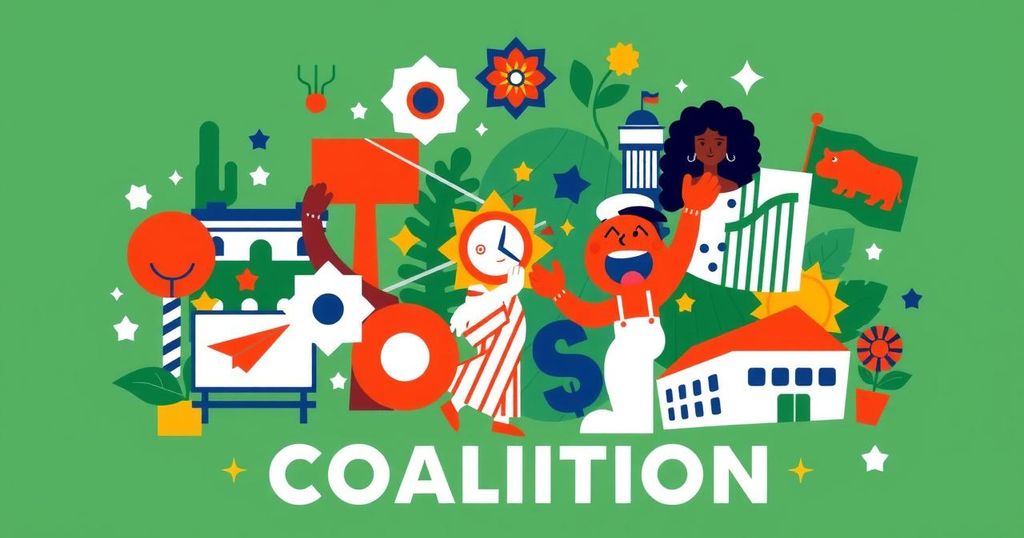World news
AFRICA, AFRICANEWS, CAMEROON, CHARLES BLE GOUDE, CHRISTOPHE KOFFI, CO, COALITION FOR A PEACEFUL ALTERNATION, COALITION GOVERNMENT, COAST, COJEP, COTE D ’ IVOIRE, D ’ IVOIRE, DEMOCRATIC PARTY OF IVORY COAST, DEMONSTRATIONS, ELECTIONS, EUROPEAN UNION, MGC, MOVEMENT OF CAPABLE GENERATIONS, NATIONAL ASSEMBLY, PDCI, SIMONE GBAGBO, YOUNG PATRIOTS OF IVORY, YOUNG PATRIOTS OF IVORY COAST
Ethan Kim
0 Comments
Cote d’Ivoire Opposition Parties Form Coalition Ahead of Presidential Poll
Dozens of opposition parties in Cote d’Ivoire have formed the Coalition for a Peaceful Alternation ahead of the October presidential polls. This coalition aims to advocate for electoral reform and balance power with the ruling party. Key members include the PDCI and MGC. Political analysts suggest that if the election proceeds to a second round, voter consolidation could threaten the ruling party’s position.
In Cote d’Ivoire, numerous opposition parties have united ahead of the presidential elections scheduled for October, forming a coalition known as the Coalition for a Peaceful Alternation. Their primary objectives include advocating for electoral reform and establishing a balanced power structure in light of the ruling party’s dominance. Notable members include the Democratic Party of Ivory Coast (PDCI), the Movement of Capable Generations (MGC), led by former first lady Simone Gbagbo, and the Young Patriots of Ivory Coast (COJEP) under Charles Blé Goudé.
Simone Gbagbo, speaking on behalf of the coalition, stated, “For its part, our coalition decided today to take another step forward in its project to strengthen the grouping of the opposition by formalising this structure.” However, the absence of former President Laurent Gbagbo’s party raises concerns, as the opposition is now divided into three factions, which could lead to vote fragmentation, potentially benefiting the ruling party unless the coalition expands its support base.
Political analyst Christophe Koffi asserts that President Alassane Ouattara’s administration should be concerned if the elections progress to a second round. “Unlike in Cameroon, the political parties have formed a bloc, and the electorate will be very large around this bloc,” he commented. He further emphasized the potential of opposition unity, predicting, “If they manage to force the party in power to a second round, there will be a grouping of all the opposition voters around whoever comes in pole position.”
As the campaign period approaches, the effectiveness of this newly formed coalition in influencing the upcoming elections remains uncertain.
In summary, the formation of the Coalition for a Peaceful Alternation represents a significant move by Cote d’Ivoire’s opposition parties aimed at achieving electoral reform and balancing power. Notable political figures, including Simone Gbagbo, highlight their commitment to strengthening opposition unity. However, the absence of a major party raises questions about vote division, and experts believe the ruling party may face challenges if the election moves to a second round. The upcoming electoral campaign promises to be contentious, with the impact of this coalition still to be determined.
Original Source: www.graphic.com.gh




Post Comment